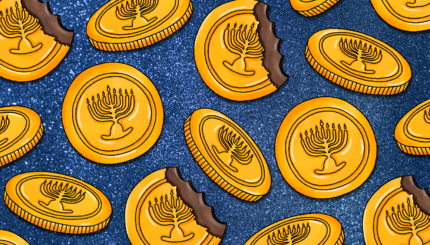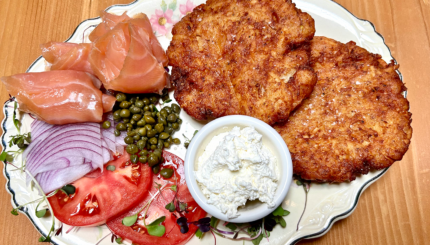I can say with absolute certainty that I was queer before I was Jewish. I was born to Jewish parents, but my Jewish identity didn’t amount to much for the decade after Jewish preschool; in those years, it was only a vague sense of difference from my Christian peers, the occasional Seder or morning of fasting, and a very slightly more refined understanding of the story of Hanukkah than public education provided my classmates.
Though it took until my early teens for my transness and queerness to surface, they quickly became more salient identities. There were far more queer and trans teens in my high school than Jewish ones, and it was simpler to research queer thinking, history, and identity than digging into thousands of years of Jewish culture, spanning multiple languages, texts, and ethnic traditions. As an atheist, and with Jewish practice all but completely absent in my household, queerness and transness felt far more urgent. When I finally welcomed Judaism into my life in my late teens, my queerness and nonbinary-transness were already firmly established.
This complicated my search for Jewish identity and fulfillment. It was impossible not to notice every gendered space and role and heterosexual ideal. I realized that meaningfully engaging in Jewish practices and spaces would involve a great deal more thought and effort than they would for a heterosexual cisgender version of myself. Like so many other trans folk, I sat in those gendered spaces, focused more on my transness than the prayer happening around me. Would I be allowed into this space if those around me know I was trans? Was I somehow attacking the sanctity of their space by not disclosing that? Jewish spaces, whether in their initial conception or their modern interpretation, were constructed for male- and female-identifying people, and not for me.
Inevitably, I wondered if it would ever be worth the struggle through the ideological and logistical battles necessary to formulate a Jewish identity and practice. After all, the secular world offers queer and trans folk enough challenge to last a lifetime. I wasn’t remaining loyal to a familial tradition. I wasn’t pursuing a sense of theistic connection. So why would I bother trying to establish myself in another cultural world which, while surely full of allies, also presents so many additional challenges?
As a teen, I didn’t have a clear answer. Now, as a queer, trans, nonbinary adult, I recognize that I turned, and continue to turn, to the Jewish community to provide me with something the secular queer community rarely can: a sense of grounding.
The challenge of navigating Jewish spaces as a queer, nonbinary person may never truly disappear, just like the challenge of navigating secular spaces. But inherent in Jewish life is history and tradition, dissent and question, and the constant re-articulation of what it means to be Jewish with each generation, family, and individual. My specific identity is only the most recent complexity the Jewish world has worked to understand and embrace. Even as it does, I am able to find moments of quiet and connection unlike those I’ve ever found anywhere else. Whether I’m dressing in affirming clothing for a Shabbat dinner with old friends or shutting my eyes to sing niggunim with new ones, gathering in a great circle for Havdalah or sitting alone to read, agonizing over a d’var Torah or crocheting peacefully away on a kippah, I am grounded by my culture, my people. Though it has been and will continue to be difficult, it has been and always will be worth it.


